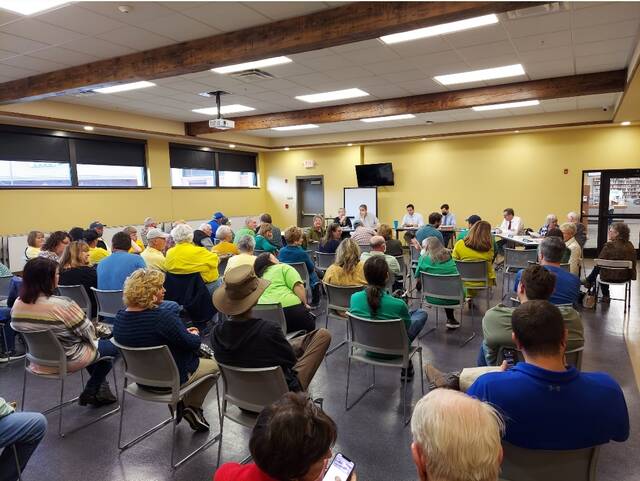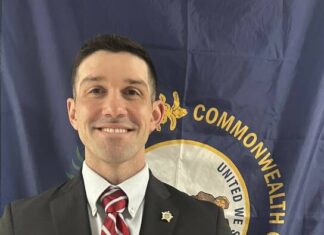
A large crowd was on hand at the Mason County Library for the Joint Planning Commission’ss meeting about industrial solar farms in Mason County.
Members of the Mason County Joint Planning Commission were back at it on Wednesday to discuss requirements for the zoning ordinance governing industrial solar farms in Mason County.
Earlier in March, the commissioners voted five-two in favor of recommending re-zoning agricultural land to industrial solar use in the county. The yes votes were by Xandy Stewart, Tom Coe, Leslie Myers, John Hutchings and Annette Walters. David Reed and Peggy Frame voted no.
Joint planning commissioners are appointed by the city and county commissioners and they’re responsible for the development of comprehensive zoning plans that benefit the community.
Wednesday’s meeting mainly focused on deliberations about the various setback distances and there was a large crowd to audit the meeting. The majority of those in attendance seemed opposed to the industrial solar farms, but they sat quietly, respecting the process. Two Maysville police officers were posted at the entrance, which signaled how high emotions ran on this particular subject, which will affect Mason County’s future.
Setback distances are a big issue, Walters pointed out.
“We have to get these ordinances right,” she said. “We don’t know what the health hazards are going to be six months from now or further down the lane.”
The U.S. Environmental Protection Agency states that toxic metals like lead and cadmium may be present in solar panels. They can also contain critical materials, including aluminum, tin, tellurium, and antimony, as well as gallium and indium in some thin-film modules.
When discussing various setback distances, Reed voiced concern about runoff and contamination due to the high level of flooding in certain parts of Mason County.
“There’s plenty of flooding and runoff in the county already. We should have a plan to handle that,” he said.
Another subject of concern debated was how battery storage would be incorporated within the solar farm property and that Mason County does not have a comprehensive fire safety plan in place. George Larger, Mason County’s Zoning and Planning administrator, said he believes the solar companies would choose where to place the batteries within the imprint of the leased property and it’s up to them to work it out.
Reed brought attention to the fact that the storage batteries are the size of tractor-trailers and recommended that setbacks should be greater for a battery field in order to protect neighbors from a potentially deadly fire. The question was also brought up about how firefighters would respond to a battery fire which could be extremely dangerous due to the threat of electrocution and could possibly turn into an environmental crisis. The main consensus by those pro-solar committee members was that the solar companies would have the expertise to implement the safety planning.
Whether cables connecting the panels would be above or below ground was discussed but it was agreed upon that the matter depended on the size and heat of the cables. Vegetation buffers were also addressed, and most of the commissioners were keen to initially incorporate a cover crop to help keep erosion down.
John Hutchins brought up Kentucky House Bill 392, which includes more stringent requirements for decommissioning plans, which Hutchins believed was likely to pass. Since most of the products used for industrial solar consist of heavy metals and contaminants that cannot be disposed of in a landfill, stringent guidelines are set to safely deconstruct and remove the panels, along with other equipment from the leased property.
Commissioners were not in agreement about the distances for the many setbacks listed, but after much discussion, the group voted in the non-binding caucus to require a 500-foot property line setback. A 750-foot setback from dwellings on 5 acres or less and 600 feet for more than 5 acres also passed. The only scenic byway in the county is U.S. 68, and that setback was voted to be 100 feet.
The main concern echoed by some of the commission members, including Walters, Reed, and Frame, were future safety issues for the community. Solar industry farms haven’t been around that long and there are still many unknowns about the potential dangers to local residents, livestock and the environment over time, officials said.
Modern environmental disasters like the Love Canal and much closer to home, Maxey Flats, illustrate the great importance of considering all possibilities when dealing with matters that could potentially become hazardous for future generations.





